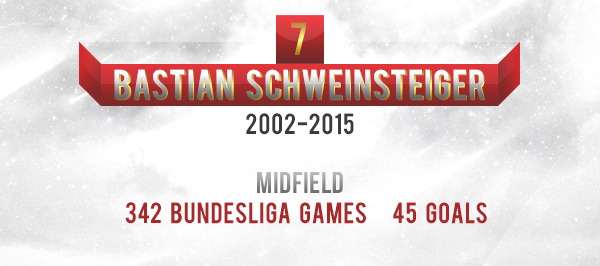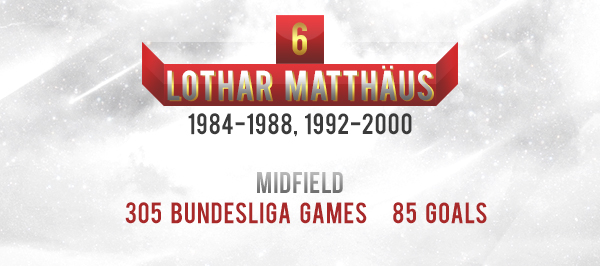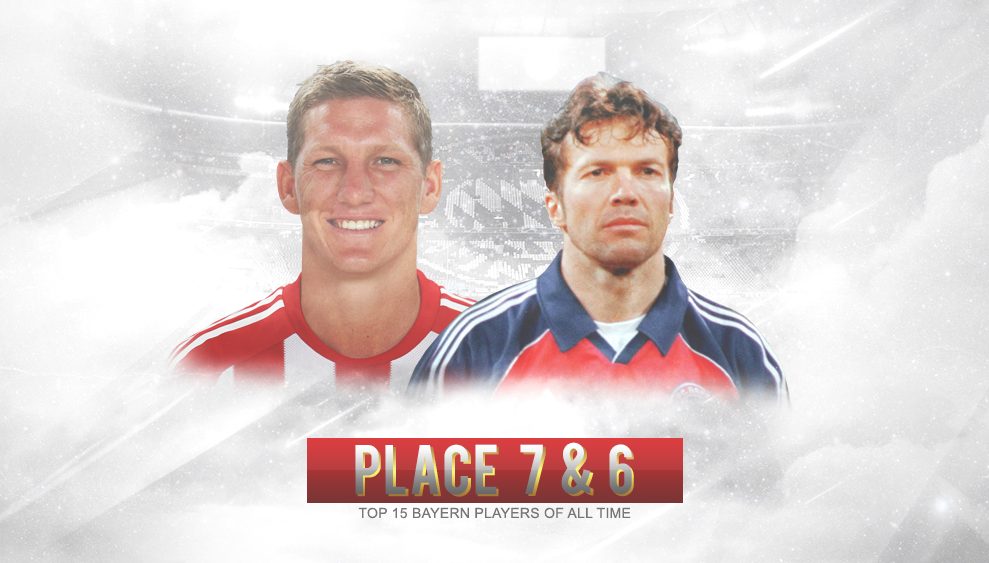Miasanrot Awards: Place 7 & 6

7th place: Bastian Schweinsteiger
by Justin Kraft
In his career Bastian Schweinsteiger has experienced many great games. In May 2012, however, he experienced one that would overshadow all other games until then. It is the final of the Champions League. In his home stadium. In 120 minutes, his team failed to put the lid on it. Although they were clearly better. Schweinsteiger has played a great game. He took responsibility from the beginning and showed presence as well as strategic intelligence. Perhaps it was his strongest game for FC Bayern to date.
Before the penalty shootout, he shows once again that he has matured into the leading player. He talks to his teammates and is the last player to take a shot. For Schweinsteiger this is not just a final. It is the possibility to win the biggest title at club level. In your own living room. Munich is his hometown, his home.
The penalty shootout is level after four rounds. Everything now depends on Schweinsteiger and Drogba. If he scores, he puts Drogba under enormous pressure. Maybe it’s the longest fifty meters that Schweinsteiger now walks. Many thoughts go through his head. He had already converted an important penalty kick in Madrid. Schweinsteiger starts. Silence. The collective pulse of an entire city can be felt at this moment. The fear of failure is great.
Schweinsteiger shoots. A fraction of a second may now decide how his performance and above all his entire career is perceived from now on. He and Lahm are branded. An extremely talented generation who have yet to earn their golden medals in order not to be considered a failure. It is the typical drama of an achievement-oriented society that places titles and success above everything else. Without this trophy with the big ears, Schweinsteiger will remain unfinished in the minds of many.
The ball flies towards Čech, who jumps into the right corner. Chelsea’s goalkeeper isn’t a penalty killer, but that night he’s outgrowing himself. He deflects the ball to the post. Only the English part of the stadium is beside themselves. All red hopes collapse. First and foremost Schweinsteiger, stunned and disillusioned, watched his penalty and immediately felt what had just happened. Drogba does it better than him. He converts and sends FC Bayern into a valley of tears. The Finale Dahoam becomes a
Drama Dahoam. With Schweinsteiger as one of the protagonists.
But if that were the end of this story, Schweinsteiger would probably not be in the top 15. Schweinsteiger got up again, outgrew himself for the last time and achieved everything he had ever dreamed of in 2013 and 2014. The long story of an unfinished man found its happy end in these two years.
But it’s not just these two titles that make Schweinsteiger so special. If you judge him only by his sporting quality, then the time in which he was really world class was probably too short. But he was there at the right moments. When the era began in 2009 with van Gaal, Schweinsteiger was a key figure. As a strategist. Many people remember the bleeding Schweinsteiger in the World Cup final.
The story of a professional who worked hard for his success and as a fighter brought the necessary virtues to lead his teams to the top. But he is more than that. Every big game with his involvement became special. He was a strategist who hadn’t existed in midfield for a long time. A number six with brain, technique, feeling and physique. Under van Gaal, Heynckes and Jogi Löw, he developed into a central figure at eye level with the best in the world.
In FC Bayern’s greatest triumph in recent history, he made a decisive impact by adapting his tactical role. Schweinsteigers career was a roller coaster ride. For the fans he was therefore also a figure of identification. He was and is one of them. The Fußballgott belongs in every Hall of Fame of German football and especially in the Hall of Fame of FC Bayern. He was one of two faces of the first golden generation of the new millennium.

6th place: Lothar Matthäus
by Christopher Ramm
The career of Lothar Matthäus went through many phases and several transformations. At FC Bayern he played between 1984 and 1988 and between 1992 and 2000. Towards the end of the 90s he laid the foundation for why the team is still successful today.
Lothar Matthäus’s career began in 1979 at Borussia Mönchengladbach. Coach Jupp Heynckes supported the young midfielder at that time. The following summer, Matthäus was already in the national team squad. Although it was only enough for 17 minutes of play, his CV includes the win of the Euros.
In the 1983/84 season Mönchengladbach again played a strong season, the team reached the third place in the table and entered the DFB Pokal final. There he met his future employer. Before the final Matthäus had announced his transfer to the German record champion. In the penalty shoot-out – after regular playing time it was 1:1 – he missed his penalty. This circumstance should provide for discussions for a long time. Also because the story with Dante in the early summer of 2012 repeated itself almost similarly, but that is a different story.
The Bavarians paid about 2.4 million marks and hoped for more competitiveness. The year before they had lost Karl-Heinz Rummenigge and Paul Breitner. Right in his first season Udo Lattek coached the team with Matthäus as the central figure to the Bundesliga title. The title was a victory from start to finish. Already from the first matchday, Bayern were at the top and did not give up this position. At that time, Lothar Matthäus was a midfielder together with his partner Sören Lerby. As a midfielder he scored 16 goals and ahead of striker Roland Wohlfahrt he became top scorer for the Munich team in this Bundesliga season.
The Munich team also won the Bundesliga in the 85/86 and 86/87 seasons. It was the title hat-trick for Bayern. The team was at their peak in 1987 and reached the final of the European Champions Cup. Matthäus, meanwhile captain, led the team as favourite on the field in the Wiener Prater. Kögl put Bayern ahead, but Madjer’s (77th) heel and a goal from Filho (80th) shattered the dream. It was to be twelve years before the Reds had the chance to win the Champions League again.
The following year, the team came in second behind Bremen, but a change was inevitable. Lothar Matthäus moved to Inter for 8.4 million marks. At the end of the 80s and beginning of the 90s Italy was the hub of world football. Every star was drawn to Italy. So was Lothar Matthäus.
Under Giovanni Trapattoni Matthäus developed into a world star. Also in his first season he won the title with Inter, which had to wait nine years for a title beforehand. Together with Diego Maradona he was the figurehead of football at that time. The following year, the 1990 World Cup took place in Italy. Germany was on the verge of reunification and football developed a bonding force. Matthäus directed the German midfield and scored four goals. Just like 1982 and 1986, Franz Beckenbauer’s team reached the final and this time defeated Argentina 1-0. Andy Brehme scored the winning goal because Matthäus, a regular penalty taker, did not feel comfortable in his shoes. Years later, the man from Herzogenaurach defended this decision as the best of his career.
1990 also marks the peak of Lothar Matthäus’s creative power. In addition to the World Cup title, he also received four personal awards: Germany’s Footballer of the Year, Europe’s Footballer of the Year, World Footballer and World Sportsman of the Year.
On April the 12th 1992, Lothar Matthäus tore his cruciate ligament against Parma. Shortly before, he had actually reached an agreement with Juventus about a change. At the time, cruciate ligament ruptures were the worst injuries in football. Despite an operation at the now legendary Dr. Steadman in Colorado, Juventus withdrew his offer and FC Bayern took advantage of the moment and brought Matthäus back to Munich. This was only possible because he assured in writing that he would not play for any Italian club in the future.
He made his comeback at the Munich club in autumn. The championship was narrowly missed in 1992/93, but twelve months later it was time again. After four years of waiting, the Munich team secured the title. Berti Vogts used Matthäus as libero after weak test matches before the 1994 World Cup. It shouldn’t take long and he also took on this role at FC Bayern.
After tearing his achilles tendon at the age of 33, many experts were of the opinion that Matthäus could no longer return to his level. The season was not crowned with success without him, but FC Bayern played in the UEFA Cup in 1996/97. There, the Munich team secured the title. It was another trophy in his collection.
There was a conflict between Matthäus and Klinsmann, who were both with FC Bayern at the time. This was already the case at Inter, where they also played together. In the summer of 1996, Matthäus published a “secret diary” in BILD in which he published internals from the team. It was the birth of FC Hollywood. This led to his dismissal as captain of FC Bayern Munich. However, he still dictated what happened on the pitch. The Munich team brought in Giovanni Trapattoni as coach and again became German champions in the 1996/97 season. It was the fifth title for Matthäus.
Ottmar Hitzfeld took over the team for the 1998/99 season and he still relied on the talent of the 38-year-old player. As a libero he made his mark on the Bayern games and at the end of the year he was voted ‘Germany’s Footballer of the Year’. For Bayern it was enough to win the championship and at the end of the seasons they were in the final of the Champions League. The Munich team took the lead early with a free kick from Mario Basler and had numerous chances to increase their lead. Matthäus had been replaced shortly before the end of the match, because he believed that he would win. United scored two goals in injury time. The dream of the ‘last’ missing title burst again for Matthäus.
In spring 2000, Matthäus moved to the MLS and the New York Metro Stars. He played his last game for Bayern on 8 March 2000 in the Champions League match against Real Madrid, which was won 4-1. The Munich team already won the first leg in Madrid 4:2. The Olympic Stadium turned into a madhouse. It was the birth of the Bestia Negra.





